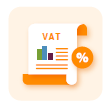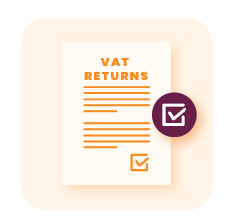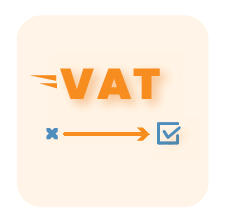VAT Returns & Recovery in Poland
After obtaining a Polish VAT number, businesses must periodically file VAT returns for their sales in Poland.
The due date for monthly VAT returns is the 25th of the month following the one in which the tax obligation occurred. For quarterly VAT returns, the due date is the 25th of the month after the end of the relevant quarter. Generally, VAT is paid to the tax office at the time of filing the VAT return.
Selling in Poland?
VAT Returns in Poland
Exempt Supplies or Equivalent
According to Article 43 of the Polish VAT Act, specific goods and services, such as certain medical and financial services, are considered “exempt,” and no VAT is charged on their supply. In the case of an exempt supply, a taxpayer is not allowed to claim an input VAT deduction for any VAT expenses incurred, which is different from a zero-rated supply where input VAT deduction is permitted.
Corrective returns
If a taxpayer has incorrectly recovered input VAT, a corrective declaration is needed to amend the previous return. Should there be any outstanding payment due after this correction, the taxpayer will face a penalty as well as interest charges for the delayed VAT payment.
Taxpayers have a five-year window, starting from the beginning of the year when the right to claim a deduction first arose, to adjust any errors in input VAT. Similarly, errors in output tax can be rectified within five years from the end of the year in which the Output VAT was due. Late payments in such cases will incur penalties.
VAT Recovery in Poland
A taxable entity can claim input tax, which is the tax paid on goods and services acquired for business use, as long as it’s related to the taxable supplies they make. This input tax is recovered by offsetting it against the output tax that is charged on the supplies they produce.
However, input tax is not recoverable if it’s directly associated with the production of VAT-exempt supplies. In situations where a Polish taxable entity deals in both exempt and taxable supplies, they are not permitted to deduct all the input tax. This scenario is referred to as “partial exemption.”
For supplies subject to VAT, the input tax is fully recoverable, but it’s not recoverable for VAT-exempt supplies. It’s important for each category to separately account for input tax that isn’t directly attributable to either taxable or VAT-exempt supplies.
Refunds from other EU countries
If you’re an authorized entity from a European Union member state, you may qualify for a VAT refund in Poland. This refund applies to goods and services bought within Poland, or to goods imported into Poland, provided they were used in activities that entitle you to deduct tax in Poland or in the country where VAT is settled (outside of Poland).
Refund requests must be submitted in Polish electronically to the Head of the Second Tax Office for Warszawa-Śródmieście, via the tax administration of your home Member State. The Tax Office will acknowledge receipt of the application electronically.
The application should include an invoice or customs document if:
- The invoice or customs document value is EUR 1,000 or more.
- The fuel invoice is EUR 250 or more in PLN.
Unless stated otherwise, amounts in euros (EUR) are converted to PLN using the average exchange rate published by the National Bank of Poland on the last business day before the invoice or customs document was issued.
Applications must be submitted by September 30th of the year following the fiscal year to which they pertain to be eligible for consideration.
Minimum refund limits:
The requested VAT refund cannot be less than the PLN equivalent of:
- EUR 400 for periods less than one fiscal year, but not less than three months.
- EUR 50 for periods greater than one fiscal year, but not less than three months, the fee is 50 EUR.
VAT refunds for foreign entities
Under the Decree by the Polish Minister of Finance dated April 23, 2004, foreign entrepreneurs from EU countries who are not VAT-registered can apply for a VAT refund in Poland. Non-EU entities are also eligible to apply, provided there’s a reciprocal arrangement for Polish companies.
You might qualify for a foreign VAT refund if you satisfy the following conditions:
- The EU country where the purchase was made does not recognize you as having a registered office, a permanent business location, a permanent residence, or a usual place of residence.
- As an active VAT payer, your sales are not exclusively VAT-exempt, and you do not use the subjective VAT exemption even if your sales are VAT-exempt.
- If your activities are exclusively VAT-exempt, either due to specific types of activities or because your annual turnover does not exceed PLN 200,000, you are not entitled to a refund.
Both the European Commission and the Polish Ministry of Finance provide comprehensive details on VAT refund regulations in other Member States, including the types of goods and services eligible for a refund.
Last Updated: 10/01/2023
Disclaimer
The information provided by Global VAT Compliance B.V. on this webpage is intended for general informational purposes only. Global VAT Compliance B.V. is not responsible for the accuracy of the information on these pages, and cannot be held liable for claims or losses deriving from the use of this information. If you wish to receive VAT related information please contact our experts at support@gvc.tax








